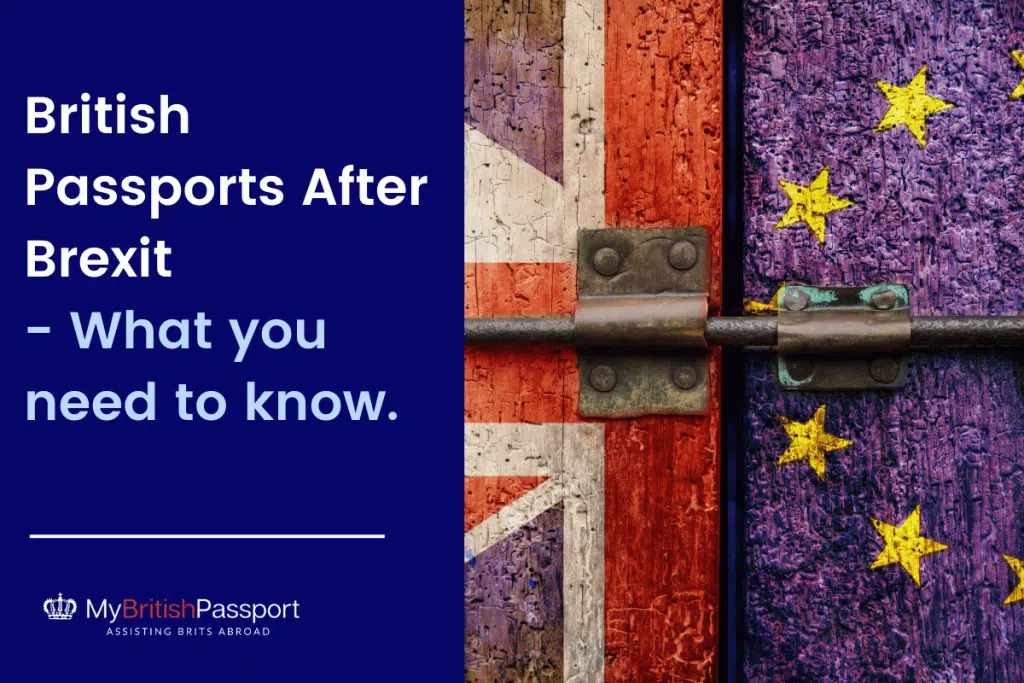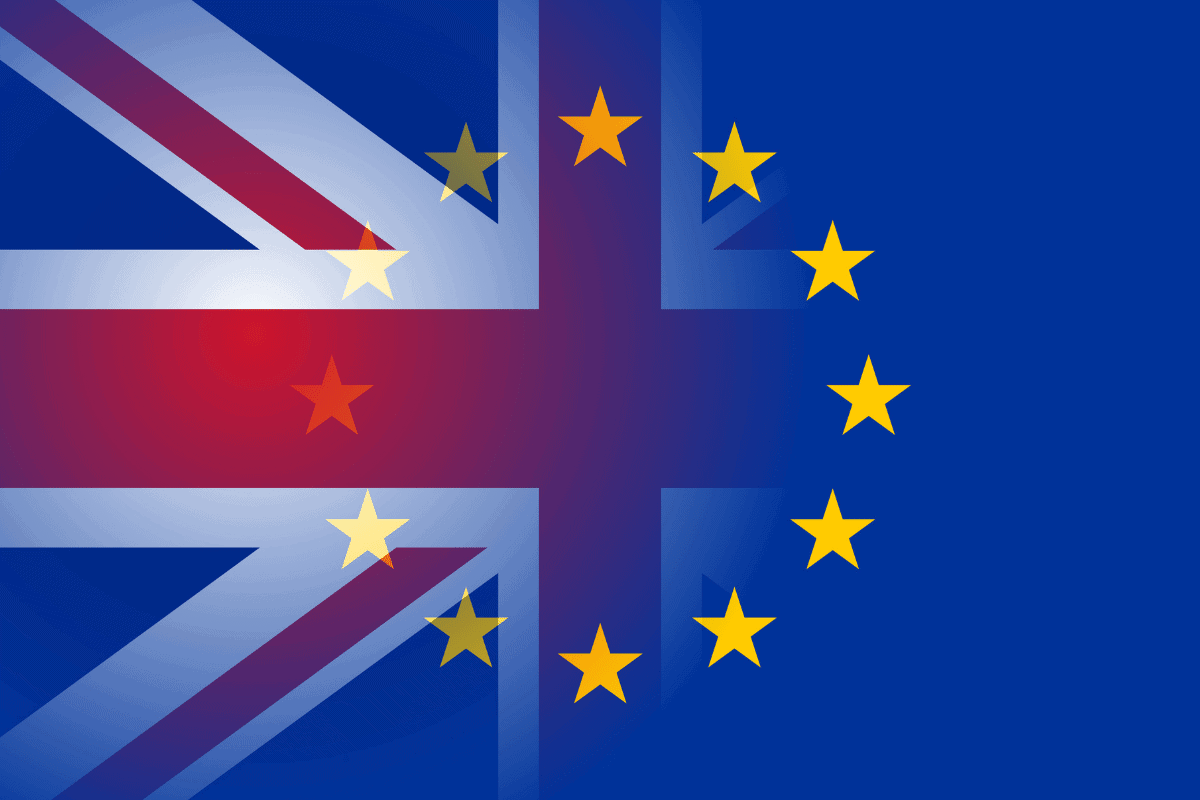British passports after Brexit: When the UK left the European Union in January 2020, a transition period followed until the end of the year. Which left some confusion regarding British Passports After Brexit.
During this time, Brits could still travel as much as they wanted (and for any reason) to any EU country.
In addition, British passports changed appearance from the old, maroon colour to the new, blue shade.
Quick Overview
UK passports remain valid after Brexit, even the burgundy ones. You don’t need to swap it just because the EU has changed. That said, you should renew your passport if any of the following apply:
- It has six months or less until it expires.
- It was issued more than ten years ago.
- You’re down to two or fewer blank pages.
- The passport is damaged or defaced.
Renewals from abroad can take a bit longer, so it’s wise to start early.

Many of our clients here at MyBritishPassport often ask us if there is anything they need to know about the change in British passports after Brexit and we have therefore compiled this handy guide to help:
Do I need to get a new UK passport after Brexit?
The good news is that, no, you do not need to get a new British passport after Brexit.
Your current, maroon-coloured UK passport is still very much a valid travel document and you can continue to use it as you normally would.
Of course, like anything in life, there are always exceptions and you will only need to get a new UK passport if any of the following is true for you:
- Your current British passport has 6 months validity (or less) remaining
- The passport is still valid but is older than 10 years
- You have only 2 blank pages (or less) in the passport for stamps
- Your passport has been damaged or disfigured
Renewing your British passport from abroad takes about a week or two longer, so MyBritishPassport therefore recommends starting the process as soon as possible. Click here to renew your British Passport online.
Many immigration officials and airlines will not consider your passport as a proper travel document if it’s older than 10 years, even if it is technically still valid. If this is the case with you, rather have it renewed now.
Most authorities require that passports have at least 2 blank pages remaining for stamps and visas. If you are running out of space in your current passport, it would be a good idea to have it renewed soon.
Applying for a “maxi” passport is an excellent option for those who travel often as it has far more blank pages and means that you won’t need to renew your passport as often.
READ | Find out which countries are Visa-free with a British passport.

Is my British passport still valid after Brexit?
Yes, your British passport is still valid after Brexit, but if you’re planning to travel within the EU or Schengen zone, you need to meet some extra conditions.
- Validity after Brexit: British passports remain fully valid. No change in general — it’s still your travel document of choice.
- EU/Schengen travel rules (post‑Brexit): To be accepted:
- Your passport must have been issued less than 10 years before the date you enter an EU/Schengen country.
- It must be valid for at least 3 months beyond the day you plan to leave the EU/Schengen area.
- Your passport must have been issued less than 10 years before the date you enter an EU/Schengen country.
If travelling outside Europe (e.g.,the US, Canada, Australia), other countries often require 3 to 6 months’ validity on your passport past your trip date.
Can UK citizens travel to EU after Brexit?
The short answer is, yes, UK citizens can still travel to the EU after Brexit, but there have been a few changes:
- British citizens may now only stay in an EU country for up to 90 days, provided that they are there for holiday/tourist purposes.
- UK nationals will now need to apply for a visa should they wish to study, work or conduct business in the EU.
- Brits may no longer use the “EU” queue at the border.
- UK citizens may be questioned by border officials regarding the nature of their trip before being allowed entry into the EU.
The above are the main changes for British nationals, but there have been other, minor changes in terms of healthcare, driving and pets:
Travel and Health Insurance.
However, as a British citizen, you are no longer eligible for EU benefits when traveling, such as free healthcare.
In the past, UK nationals could hold an EHIC (European Health Insurance Card), but you will now need to ensure that you have sufficient travel and health insurance before leaving.
Driving in the EU after Brexit.
Another change that has been brought about by Brexit is driving in an EU country.
If you want to drive in a European Union country, you will now need to have an international driving licence, as well as proof that you are properly insured. This is for the purposes of renting a car in the EU, as well as EU regulations.
Pet travel in the European Union.
Before Brexit, UK nationals could freely take their pets with them into the EU.
As expected, the regulations for pet travel have now changed. Should you wish to travel with your pet into Europe, you’ll now need to obtain a pet passport, which could involve proving that the animal does not have Rabies or other common diseases in cats and dogs.
Has the British passport renewal process changed after Brexit?
Luckily, there has been no change in the way UK passports are renewed after Brexit. You are still required to complete the online form, send in your old passport and submit digital photos.
As always, it is vital that everything is 100% correct as even a minute detail can mean that your renewal is rejected.
MyBritishPassport can help you with your UK passport renewal and ensure that everything is perfect.
We specialise in British passport renewals from abroad.
Ready to renew your UK passport? Simply click here, complete the easy form, and you are good to go!
“UK Passports provided outstanding service in the renewal process for my passport. Saretha was the consultant I worked with and she was very professional in her dealings with me and was prompt in answering my questions and concerns. I would not hesitate to recommend her services for those seeking to renew their passports.” – Fraser MacDonald via Google Reviews
Conclusion. Passport Renewal After Brexit
British passport holders who are not based in the UK may need to take a few extra steps when renewing their passports in order to ensure that they will be able to continue travelling freely in the European Union. There have been some changes to the regulations for British nationals travelling within the EU, so it is important to be aware of these before you go.
The main changes are: British citizens can now only stay in an EU country for up to 90 days, UK nationals will now need to apply for a visa should they wish to study, work or conduct business in the EU, and British citizens may be questioned by border officials regarding the nature of their trip before being allowed entry into the EU.
“Since the UK left the European Union in 2020, UK passport holders are now seen as ‘third-country nationals’ by EU and Schengen countries.” – postoffice.co.uk
Related Articles
- British Passport Types
- Where Are UK Passports Printed
- British Passport Ranked 5th in the World for 2025
- UK Blue Passport
Contact MyBritishPassport
MyBritishPassport specialises in British Passport renewals from abroad. Get in touch with us today.





